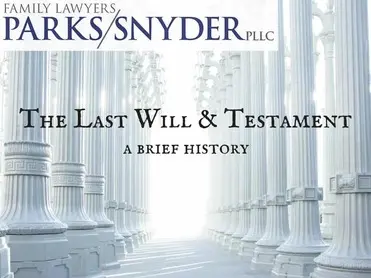
A Brief History of the Last Will and Testament
Throughout history there have been pivotal individuals responsible for great change and advancement in our society. The development of our current last will and testament law is no exception. We owe much of our ability to choose how we want our property distributed when we pass to a man named Solon. Here I want to briefly trace the history of the legal document known as the Last Will and Testament, and Solon plays a key role in that story.
Solon and the Ancient Greeks
Solon was a reformer statesman in ancient Athens, Greece. He lived before Christ. The law before his time was attributed to another Greek leader, Draco, but that law was exceedingly harsh and severe, hence a word still used meaning just that: draconian. Solon determined to make the law more moderate. For instance, before his change of the law, a person had to leave his estate exclusively to family members. With Solon’s new laws, others could be beneficiaries of a Will. As the historian Plutarch reports, Solon “thus put every man’s estate in the disposal of the possessor.” Well, almost so. A man could leave property to others only if he had no sons; if he had only daughters, those men to whom he left his property had to marry his daughters!
Rome followed Greece. The intent in Roman law was that a man could make his own disposition of his estate by a Will, but the prime purpose of inheritance remained the preservation of the family, and family inheritance was strongly favored.
The Christian Influence
The Judeo-Christian tradition also influenced the law of estates. In Genesis 48, the patriarch Jacob leaves a double portion of his inheritance to the sons of his son Joseph. In early Christianity under the Roman Emperor Constantine, people were expected to always leave a bequest to the state-sanctioned Church.
Our law primarily derives from Roman, Church, and English law. Some vestiges of the Roman influence are evident in the language lawyers use in wills; for example, the term per stirpes, meaning that a group of beneficiaries inherit standing in the shoes of, and representing, a deceased ancestor, usually a deceased parent. When the colonists came to North America, they brought with them the long-entrenched traditions of law as those traditions had developed in the home country of England. As early as King Canute in the 11th century A.D., it was expected that people would die having made a Last Will and Testament.
The English Influence
English legal principles included the history of individual protection against tyranny, embodied early in Magna Carta (a source of our Bill of Rights). Also implanted on American soil was the splendid right to determine the disposal of one’s own possessions of property, after one had died. Government could, if the people allowed, dictate how property is to be left to others (government does in fact have provisions to do this when a person has not made a Will).
The Last Will and Testament Today
Americans have enjoyed the right and privilege of deciding how to leave their estates since the beginning of the country. We strongly encourage all of our clients who are adults and have spouses or descendants, or who possess an estate of any size, to make a Will. It’s not hard and we’re here to help.
In a future post, we will address the very interesting Wills of our founding family: George and Martha Washington.




